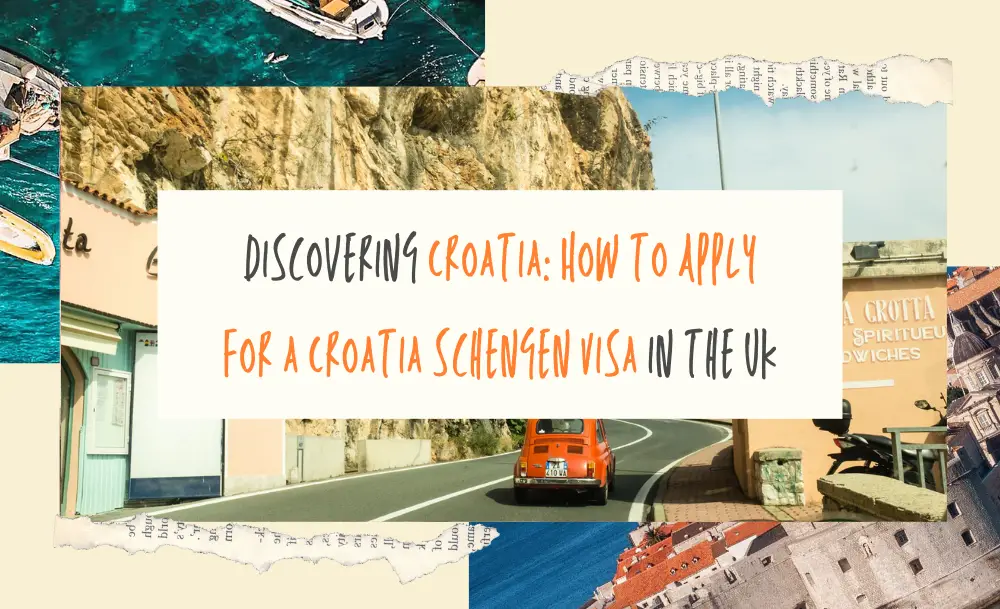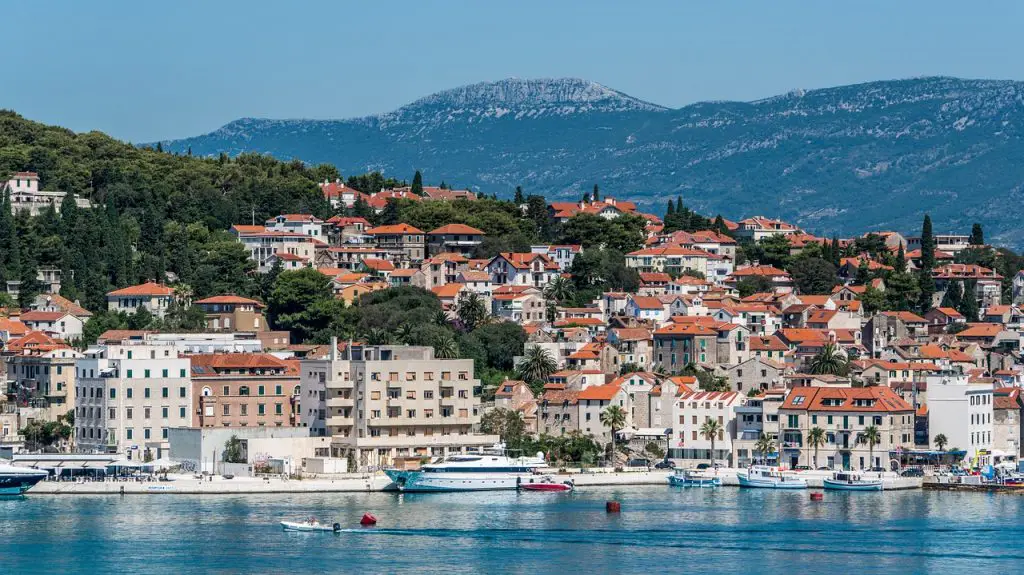Discovering Croatia: How to Apply for a Croatia Schengen Visa in the UK

Croatia boasts one of the most picturesque coastlines in Europe, with its breathtaking beaches along the Adriatic Sea attracting swimmers, sun seekers, and sailors alike.
The crystal-clear waters and pristine shores are perfect for relaxing under the sun, while the countless inlets and over 1,000 islands offer endless exploration opportunities.
From the charming, historic coastal towns like Dubrovnik and Split to the serene, hidden coves and vibrant marine life, Croatia’s coastline is a paradise for adventurers and tranquillity seekers. Whether you're sailing through the Dalmatian archipelago, lounging on the stunning Zlatni Rat beach, or diving into the turquoise waters of Hvar, the beauty of Croatia's coast promises an unforgettable experience.
If Croatia has ever been on your travel radar, now is the perfect time to start planning your adventure. This Mediterranean gem becomes even more accessible.
Croatia is now part of the Schengen Area, making travel seamless for many visitors.
Let's dive into everything you need to know about obtaining a Schengen Visa for Croatia and why this enchanting destination is a must-visit for UK holidaymakers and non-EU nationals.

Understanding the Schengen Area
The Schengen Area comprises 27 European countries that have abolished passport control at their mutual borders. This means once you have a Schengen Visa, you can travel freely between these countries.
As of January 1, 2023, Croatia officially joined this list, simplifying travel for millions.
Citizens of Schengen countries can enjoy seamless travel across the Schengen area without needing a visa. While there are no border checks, travellers from Schengen countries must still present a national identity card or passport at Croatian borders to confirm their nationality. This ensures a smooth and hassle-free entry into Croatia’s stunning landscapes and historic sites.
At the end of March 2024, Bulgaria and Romania partially joined the Schengen area by eliminating internal border checks by air and sea but it's not yet applicable to land borders.
Who Needs a Schengen Visa?
A Schengen visa is a permit granted by a Schengen state that allows travellers to enter the Schengen area for the purpose. Short-stay visas are stays of no more than 90 days within any 180-day period.
You may need a visa to enter Croatia depending on which passport you hold.
UK Citizens: After the United Kingdom left the European Union, British nationals can stay in Croatia (and the Schengen Area) visa-free for up to 90 days within any 180-day period for tourism, business, or family visits.
Holders of Travel Documents (1951 Convention Travel Document and Stateless persons): Recognised refugees, stateless individuals, and others without a nationality who reside in the United Kingdom or Ireland and possess a travel document issued by these countries do not need a visa to enter or transit through Croatia. They can stay for up to 90 days within any 180-day period.
Non-EU Nationals: If your country of residence isn't part of the visa-free regime with the Schengen Area, you'll need to apply for a Schengen Visa to visit Croatia.
Visa-Free Agreements: The EU currently has a visa-free agreement with some countries/territories where non-EU citizens with a biometric passport can enter the Schengen area for short stays without needing a visa.
Under the agreement, the principle of visa reciprocity applies which means that EU citizens can travel visa-free to non-EU countries that allow their citizens to visit the EU without a visa.
Roughly 60 non-EU countries and territories have signed visa exemption agreements with the EU. Here are the countries with visa-free agreements with the EU.
| COUNTRIES | |||
| Albania | El Salvador | Moldova | San Marino |
| Andorra | Georgia | Monaco | Serbia |
| Antigua and Barbuda | Grenada | Montenegro | Seychelles |
| Argentina | Guatemala | Nauru | Singapore |
| Australia | Honduras | New Zealand | Solomon islands |
| Bahamas | Hong Kong | Nicaragua | South Korea |
| Barbados | Israel | North Macedonia | Taiwan |
| Bosnia and Herzegovina | Japan | Holy see | Tonga |
| Brazil | Kiribati | Palau | Trinidad and Tobago |
| Brunei | Kosovo | Panama | Tuvalu |
| Canada | Macao | Paraguay | Ukraine |
| Chile | Malaysia | Peru | United Arab Emirates |
| Colombia | Marshall Islands | Saint Kitts and Nevis | United Kingdom |
| Costa Rica | Mauritius | Saint Lucia | United States |
| Dominica | Mexico | Saint Vincent and the Grenadines | Uruguay |
| East Timor | Micronesia | Samoa | Venezuela |
Currently, agreements with Belarus, Russia, and Vanuatu are partially or fully suspended.

Who Can Apply for a Schengen Visa in the UK?
To apply for a Schengen visa in the UK, you must:
- Have a valid passport or travel document.
- Hold a valid UK residence permit. If you only have a short-stay (C type) visa for the UK, you need to apply for a Schengen visa from your home country.
- Be applying for a short-stay visa, such as for tourism, visiting family or friends, business, or airport transit.
Applications should be submitted at least 15 days before the intended travel date, and no earlier than 6 months before the scheduled trip.
If you need assistance with your Schengen Visa application, reach out to IaM.
How to Apply for a Schengen Visa for Croatia in the UK.
Step 1: Determine Your Visa Type: Depending on your purpose (tourism, business, visiting family/friends, medical treatment etc), choose the appropriate visa type and how many entries you need for your visa.
Step 2: Schedule an appointment at the visa centre. Applicants for a Croatian Schengen visa who live in the UK are advised to submit their visa application in person at the Visa Application Centre – VFS Centre in London, Manchester, or Edinburgh.
Due to high demand, it is recommended to look for an appointment at least 2 months before the trip to avoid hiccups in the application process.
Step 3: Gather Required Documents: Generally, you'll need a completed application form, passport photos, a valid passport, travel insurance, proof of accommodation, flight itinerary, and financial proof.
Step 4: Submit Your Application at the scheduled appointment and attend a short interview to discuss your travel plans then pay the fee.
Step 5: Wait for Processing: Visa processing typically takes about 15 days, but it's advisable to apply well in advance of your travel dates. However, if the required documents are not submitted correctly or due to other factors or valid reasons, the processing time may be extended to 30 or 60 days.
Visa Fee For UK Residents
These are the fees you need to pay when applying for a Croatian Schengen Visa.
| Fee | GBP |
| Visa Fee | 70.95 (exemption: for nationals of Georgia, Moldova, and Ukraine, the visa fee is 30 GBP unless the Visa Facilitation Agreement prescribes otherwise) |
| Service Fee | 25.00 |
The following are exempt from visa fees upon application:
- Family members of citizens of EEA Member States,
- Children up to the age of 12,
- Holders of diplomatic and service passports travelling in their official capacity
- Pupils, students, postgraduate students, and teachers accompanying them when they come to attend school, study and professional training,
- Researchers coming to conduct research, as provided for by the Recommendation of the European Parliament and of the Council of 28 September 2005 to facilitate the issue by the Member States of uniform short-stay visas for researchers from third countries travelling within the Community for the purpose of carrying out scientific research,
- Representatives of non-profit organizations up to the age of 25, who are to attend seminars, conferences, sport, cultural, or educational events organized by non-profit organizations.
Can You Extend Your Croatia Schengen Visa?
Traveling through Croatia and wish to stay longer than your Schengen visa allows? Extending your short-term visa in Croatia is possible under certain conditions.
To extend your short-term visa, you need to meet specific criteria. The Croatian Ministry of the Interior will consider your application if you can provide proof of the following:
- Force Majeure or Humanitarian Reasons:
- Situations beyond your control, such as natural disasters or serious health issues, preventing you from leaving Croatia before your visa expires. Extensions for these reasons are free of charge.
- Serious Personal Reasons:
- Valid personal reasons, such as family emergencies, that justify extending your stay. For these cases, there is a fee of 30 EUR.
Steps to Apply for a Visa Extension
If you find yourself needing to extend your stay, follow these steps:
- Fill Out the Visa Application Form:
- Complete the form accurately and sign it by hand.
- Present a Valid Travel Document:
- Ensure your passport or travel document is valid throughout the extended stay period.
- Provide Supporting Documents:
- Submit evidence supporting your reasons for the extension, such as medical certificates, proof of family emergencies, or other relevant documents.
- Proof of Sufficient Funds:
- Demonstrate that you have enough financial resources to support yourself during the extended period.
- Travel Health Insurance:
- Show proof of valid travel health insurance covering the additional period of your stay.
Important Considerations
- Maximum Stay Duration: Despite an extension, you cannot stay in Croatia for more than three months within a six-month period from the date of your first entry.
- Application Timing: Submit your extension request at a police administration or station before your current visa or authorized stay period expires.
- Approval Process: The police administration/station will handle your application and will need preliminary approval from the Ministry before granting the extension.
Where to Apply for Extension?
You need to file your extension request at the nearest police administration or station in Croatia. The extension will be processed and issued by the police after obtaining the necessary approval from the Ministry of the Interior.
Travelling To Croatia In 2024
After Brexit, things have changed when travelling to the EU. Here’s our checklist for everything you’ll need when travelling to Croatia in 2024.
1. Convert Pounds To Euros
Croatia adopted the euro from 1 January 2023, which will make life simpler for British holidaymakers. Most hotels, shops, restaurants and ATMs in Croatia accept international debit and credit cards.
Sometimes this is better value than exchanging cash, but it’s important to check how much your card issuer charges for use abroad.
2. Check your passport is valid
Since Brexit, the British passport needs to meet several criteria to be considered valid by any EU country (except Ireland)
- It must have been issued less than 10 years before the date you arrive
- It must be valid for at least three months after the date you depart
- Must have at least 2 blank pages for visa stamps
If the British passport was issued before October 2018, it may have had extra months added to the expiry date, so double-check if it needs renewing before booking a holiday to Croatia or other EU countries.
It is also advisable to save a copy of your passport's bio page in case you misplace it when travelling.
3. Travel Insurance
It’s essential that you have a travel insurance to cover unexpected medical treatment at a private hospital or clinic, travel disruption, lost or stolen luggage, or repatriation to the UK.
4. Pack your UK driving licence
If you’re planning to rent a car in Croatia, you don’t need an International Driving Permit as you can use your UK licence for up to 12 months.
If you’re driving your own vehicle, it must display the letters ‘UK’ in the number plate or a UK sticker (‘UK’ replaced ‘GB’ in 2021) and you must take your vehicle logbook (V5 registration certificate) and a motor insurance certificate.
5. Stay Connected
Consider getting a local SIM card or an international roaming plan to stay connected. Check your mobile provider if they charge extra for roaming services. Many cafes and public places offer free Wi-Fi, but having your own data plan can be convenient.
Croatia prides itself on its natural beauty. Help preserve this by following local guidelines, such as respecting wildlife, staying on marked paths in national parks, and reducing plastic use.
Do you need to renew your passport? Talk to us in the comment section below. Or if you need more advice on the above, contact us for further travel & immigration advice.
Check out the deals we have found below and tell us your travel plans.
Check out the offers and discounts from:
And because of the pandemic, don’t forget to get your travel insurance, which will cover you for flight disruptions and pandemic related matters.
IaM can help with your visa application to Europe, the United States, the UK & other countries
If you need help with a US visa, a UK Visa, or a visa to Europe, including help with appointment booking obligations, IaM can help. For more information and advice on US immigration, UK immigration law and US visa applications or if you need any help or assistance please, reach out to your Visa Coordinator at IaM.
Some of our posts include affiliate links. If you choose to purchase any of these products, we might get a small commission. For more information, check out our TOS.
- UK Issues Travel Warning Over Fire Safety in Croatia - 26 June 2025
- Belgium Tightens Borders: How It Could Affect Your Schengen Trip - 25 June 2025
- ETIAS Fee Under Review: Will Travelling to Europe Cost More? - 24 June 2025











